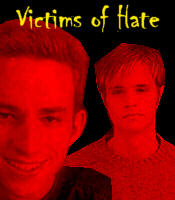 |


Rank 3rd After Race & Religion Statistics Show Violence on the Rise against Lesbians/ Gays HRC to Republican Leaders: Stop Ignoring Rising Hate Tide! |
|
Compiled By GayToday
"These unprecedented numbers indicate that somewhere in America every day at least three gay and lesbian Americans are being targeted for a crime just because they are gay. "It is profoundly disturbing that George W. Bush and the GOP leadership in Congress continue to ignore this growing problem and to turn their backs on hate crime victims and their families," said HRC Political Director Winnie Stachelberg. "People continue to die and American families continue to be torn apart while Bush and the GOP leadership pretend these types of crime do not exist." Early this week, the FBI released the Uniform Crime Reports for 1999, the latest year for which statistics are available. As overall serious crime continued to decrease for the eighth consecutive year, hate crimes based on sexual orientation have continued to rise and increased 4.5 percent from 1998 to 1999. Reported hate crime incidents based on sexual orientation have more than tripled since the FBI began collecting statistics in 1991; comprising 16.7percent of all hate crimes for 1999 at 1,317. Hate crimes based on sexual orientation continue to make up the third highest category after race and religion, which make up 54.5 and 17.9 percent, respectively of the total, 7,876.
Although Texas has had a weak penalty enhancement statute since 1993, it does not cover sexual orientation. Legislation was introduced in 1998 that would strengthen the existing state law, while also adding sexual orientation. Bush opposed this bill because it protected gay and lesbian Texans, even after the family of African-American hate crimes victim James Byrd Jr., of Jasper Texas, asked him to support it. Bush also tried to appear "compassionate" by saying he supported a federal hate crimes bill put forth by Sen. Orrin Hatch, R-Utah. But this version does not include sexual orientation. In June, the Senate voted 57 to 42--including 13 Republicans--to pass the language of the revised Hate Crimes Prevention as an amendment to the Defense Authorization bill. On September 13, by a vote of 232-192 – including 41 Republicans--the House passed a motion to instruct conferees to keep the hate crimes measure in the Department of Defense bill. Despite bipartisan passage in the House and Senate, the GOP leadership stripped out hate crime legislation while the bill was in conference. It appears now that the only way hate crimes legislation can become law is if it is made part of the final budget negotiations between the House, Senate and the White House. While the statistics are alarming, the need for comprehensive federal hate crimes legislation is even made more clear by real life examples of people who have been targeted because of their sexual orientation. For example, on September 22, Ronald Edward Gay walked into the Backstreet Cafe, a Roanoke, Virginia gay bar, and opened fire on patrons, Killing one person and wounding six others. According to the Washington Post, Gay told police that he shot seven people in a gay bar because of anger at jokes people made about his last name. Gay has been charged with first-degree murder. The revised HCPA would serve as a tool to help law enforcement by allowing federal assistance, when necessary, in the investigation and prosecution of hate crimes. According to a study funded by the Bureau of Justice Statistics, 85 percent of law enforcement officials recently surveyed recognized this type of violence to be more serious than similar crimes not motivated by bias. A recent Garin-Hart-Yang Research Group poll, conducted August 28-31, 66 percent of all voters care so much about this issue that they would be less likely to vote for a candidate who does not support legislation that would strengthen the prosecution of hate crimes motivated by prejudice against the race, religion, gender, disability or sexual orientation of the victim, which this bill does. The legislation has the support of 175 law enforcement, religious, civic and civil rights groups. |


